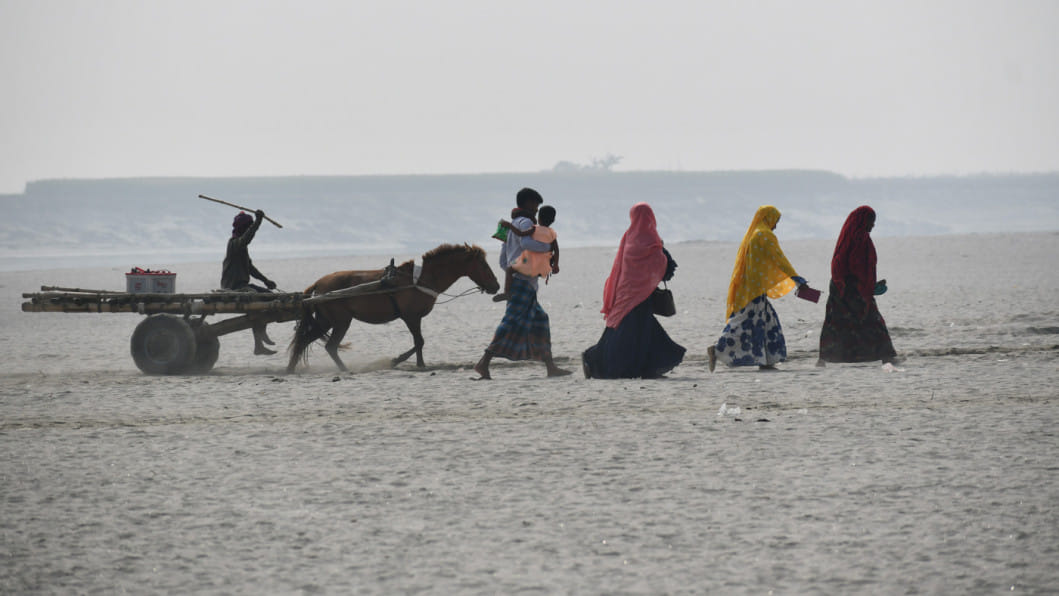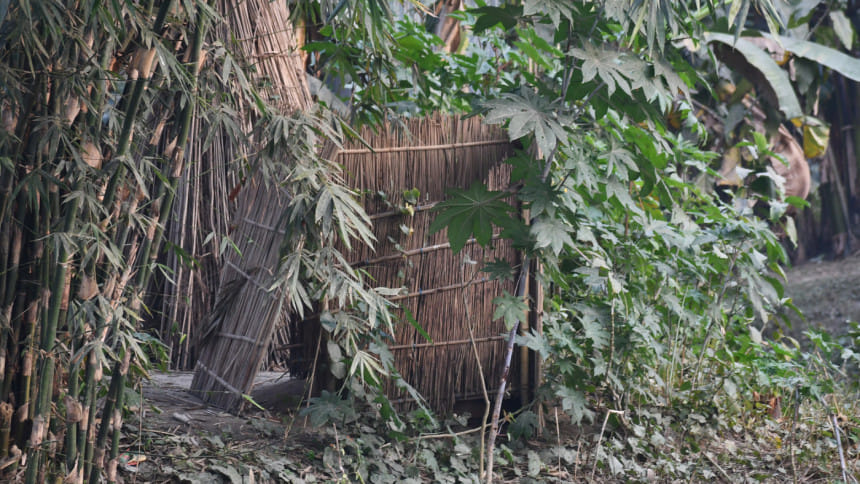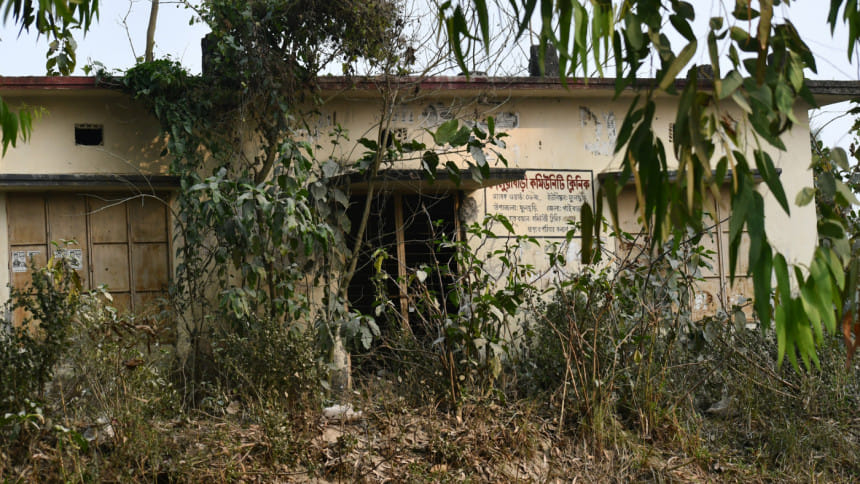Basic healthcare still out of reach for most in Gaibandha chars

On March 30 last year, nine months pregnant Helena Khatun of Kalurpara—a remote char in Gaibandha's Fulchari upazila—had to be carried on a wooden plank to the upazila health complex located about 40km away. Twenty-year-old Helena ultimately bled to death by the time she could reach the health complex.
According to inhabitants of these chars in Gaibandha, many patients have died owing to lack of treatment as there are no hospitals nearby. Women and girls suffer the most, with hardly any services for reproductive and maternal health. There is also a deep lack of awareness regarding family planning, as no one ever really worked on counselling the population here.
Stories like Helena's are quite common in these parts of Gaibandha. In 2019, Kachmati Begum, 26, another woman of the same char died in the middle of the river on her way to the hospital. Family members of Kachmati carried her on a wooden plank and walked on foot to try and reach the district hospital after she suffered a cardiac arrest.
Taslima Nashrin, 23, of Kochkhali char in Sadar upazila of the district died from on a boat in the middle of Brahmaputra river, on her way to the hospital in 2020. She was bleeding excessive after giving birth.
Bulbuli is another char in Fulchari upazila and the nearest hospital to it is located at least 10 to 12km away. In December 2022, Shirina Akhtar, 35, died on a boat at Balasighat while she was being taken to the District Headquarters Hospital. She was nine months pregnant. Five days had already passed after her labour pains started before her family decided that she needed to be taken to the hospital.
Shirina had already given birth to five children before that. Of them only two survived. "Her husband wanted a son which is why they kept having children," said Shirina's niece Akhlima Akhter.
What is the state of medical services in the chars?
There are only a few community clinics in the chars. Other than that, some local and foreign NGOs work to provide health services. But the overall number is extremely low.
Fulchari upazila, for example, has more than 1.5 lakh people living in its chars. On a recent visit to Kabilpur and Deluabari char of the upazila, this correspondent spoke to many women and found that most have little to no idea about reproductive health and rights. This correspondent observed that most women in the chars have multiple children, which is higher in comparison to the mainland.

About 5,000 people live in Kabilpur char and 10,000 in Deluabari char. There is no community clinic or hospital to serve the population here. No health worker has ever worked on creating awareness among the community on contraception methods. The only health assistants that do visit from the town do so to vaccinate the children.
Many have also lamented the lack of care during and post-pregnancy and pointed to a deep lack of knowledge about reproductive health and rights.
"During pregnancy, the women of this village generally eat only rice for all three meals. No extra care is available for expectant mothers. If there is any problem, they have to resort to the village doctor for help," said Fatema, holding her 21-month-old child in her arms.
According to Fatema, almost all the women of this village opt to deliver their babies at home as there are no clinics or hospitals nearby. An expectant mother is only taken to the hospital if the family thinks that she might die from childbirth.
The pressure to have a boy too forces many women to conceive multiple times. Sakhina Khatun, 30, already has four daughters aged ten, eight, five and one. Her husband is still hoping for a boy. Sakhina told this correspondent that both during and after pregnancy, women do not have much access to iron and calcium pills which are much needed during this time.
Halima Begum, 25, from Kabilpur char, was married off at 14 and now has three children.
"Us women here don't have any say on how many children we will have. I was married off because it's what my parents wanted, and now I must bear as many children as my husband wants."
"Women in our village do not use contraception, and it is only when the husband no longer wants any more children that we will be made to take permanent birth control methods," said another char resident Kohinoor of the same char.
The case of Deluabari, another remote char located in the basin of Jamuna river under Fulchari upazila, is much the same.
A recent visit to the Deluabari, revealed that most girls were getting married at a very early age—even before they reached 14. Most of the women in this char have three to five children due to lack of birth control.

According to the Gaibandha district Nutrition profile, 62 percent of girls got married before they were 18 and 34 percent of women had children before they were 20. In contrast, in Rangpur division, 31 percent girls were subjected to early marriages and 15 percent had children before their twenties.
Sima Begum, 21, of Deluabari char, said she got married when she was only 13. She is a mother of two girls and is expecting another one as her husband wants a son.
Ajina Begum, 26, of Deluabari char has three daughters. She got married at the age of 14. Now, her family expects a fourth child, all in the hope of a son. Ajina explains that when the family is in financial crisis, parents generally force their daughters to marry and the girls have no freedom to choose their life partner.
Fulchari Upazila Health and Family Planning Officer Dr Md Rafikuzzaman was questioned why these basic health services are so inaccessible to people in these chars. He attributed this to lack of infrastructure and a poor transport system. He added that some NGOs were working with the government agencies to provide reproductive health services. But female health workers were needed to provide girls with sex education.
Deluabari's ghost clinic
Deluabari dhar is notoriously inaccessible. About 10,000 people live in this char divided into several neighborhoods.
In 2016, the government built a community clinic in this char, but there are no community health care providers to attend to patients. As a result, the people of this char have to go all the way to the upazila or district town for any little ailment, a trip that takes around five to six hours in the dry season due to the lack of a good communication system.
Meanwhile the community clinic is in a dilapidated condition. The furnishings have become tattered and worn out, earning the clinic the name "ghost house" among villagers.
Badr Uddin, who has been elected UP member of ward no-9 in Fulchari union for 35 years said, "The clinic has been abandoned since its inception. As a result, 10,000 people do not have access to proper first aid or treatment."

Taking a pregnant woman to a hospital in case of medical emergencies is an arduous process and a potentially risky endeavour for the residents of Deluabari char. In the dry season, a family has to walk first for three kilometres carrying the patient on a wooden plank, then cross the river by a boat, and then reach the hospital by some other vehicle.
When asked about the community clinic, Fulchhari Upazila Health and Family Planning Officer Rafikuzzaman told The Daily Star, "As far as I know, the Deluabari clinic was built in 2016. There is no health worker (CHCP) in the clinic currently. A health worker was appointed in 2017 but she quit when she got another government job."
When asked why the incidence of child marriage is so high in chars, Fulchari Upazila Nirbahi Officer Md Anisur Rahman said, "It is my responsibility to prevent child marriages, but no one informs me about child marriages in chars. I have only received information about one child marriage which I prevented."
When asked how the government is delivering family planning services to the people in chars, Acting Deputy Director of Gaibandha District Family Planning Office, Prosenjeet Pronoy Misra admitted that there are no human resources to implement family planning services in these areas.
In the entire Gaibandha district, the number of posts of Family Welfare Visitor (FWV) is 99 but currently only 42 posts are filled, and they are mainly engaged in the mainland, he informed.
"No government birth control materials are provided to the chars from our side due to the lack of workforce. Only those who come to the mainland from the char can avail these services," added Misra.
According to the Gaibandha district statistics office, there are over 25.62 lakh people living in the district and over five lakh people in the chars.
The civil surgeon's office in Gaibandha said there are 320 community clinics in Gaibandha's seven upazilas. But of them, at least 11 community clinics have no Community Health Care Providers (CHCP), all of which are based in the chars.
After the upazila health complex, sub-centres have been set up in union parishad levels to provide treatment to people. An MBBS doctor is supposed to provide healthcare for 24 hours.
In Gaibandha, there are 36 sub-centers in 36 unions under six upazilas except in Saghata upazila. But there are a total of 81 unions in seven upazilas, which means at least 45 unions have no sub-centres at all. And of the ones that are there, many have no infrastructure and no doctors.
Take for example, Sundarganj upazila, where over two lakh people live in the chars. There are seven sub-centers to serve the upazila's 15 union parishads. And of them, five sub-centres have no doctors at all.
When asked, Mohammad Abul Fatah, Sundarganj upazila health and family planning officer told The Daily Star that, "We have 17 posts for medical officers in Sundarganj but only seven medical officers working. Therefore, no doctor has been allotted to the sub-centres. But our doctors do visit the sub-centers two days a week. The other four days, the pharmacists, SACMO (Sub-Assistant Community Medical Officer), and nurses provide medical facilities."
The lack of medical facilities in the chars of Gaibandha is a top-down issue, as even the district hospital is ill-equipped to serve the 25.62 lakh people who live in the district. The Sadar upazila hospital is used as a district hospital where a crisis of workforce hampers medical services for all the 25.62 lakh people.
Doctor Mahbub Hossain, superintendent of the Gaibandha General Hospital, said, "Our hospital originally had 100 beds but the beds were extended to 250 without increasing the workforce. We have 43 medical officer posts but 22 posts are vacant now. We have to provide treatment for the whole district with a limited workforce which makes it very challenging for us."
Lack of access to basic healthcare, social prejudices and poor understanding of reproductive health and rights put the women in the chars in an even worse situation than women in other parts the country. Steps need to be taken from all ends, be it raising awareness or making investments for better healthcare, to ensure no other woman has to suffer in the future.
Mostafa Shabuj is a journalist at The Daily Star.

 For all latest news, follow The Daily Star's Google News channel.
For all latest news, follow The Daily Star's Google News channel. 






Comments